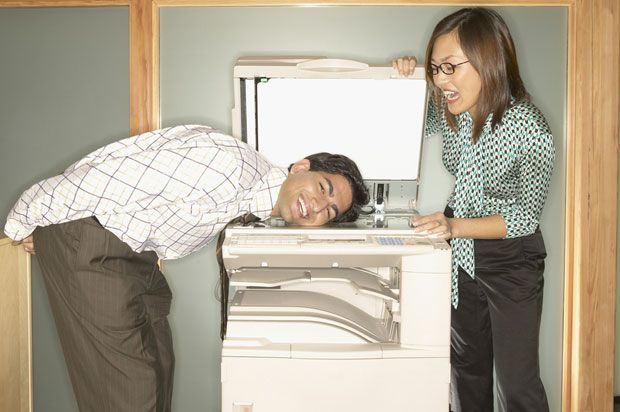Work experience
Learn new skills, make valuable contacts and get a sparkling new reference for your CV. Work experience is a great gateway to getting a job.

This is what happens when you give me a menial task
Trying to get a job in a popular industry can be something of a catch 22 situation – you need work to get experience and experience to get work. Work experience could be the solution – the company gets free labour and you get a foot in the door and the chance to see if it’s the job for you.
Why get work experience?
Even if it’s not the career you want, work experience is something to add to your CV. It looks more impressive than your 25m swimming certificate and provides a better referee than your head-teacher. You’ll also learn invaluable skills, such as teamwork and communication, that most jobs require.
If you show the right enthusiasm and determination, your placement could turn into an actual job with a salary. Graduate Prospects recently reported that 73 % of employers who take on ‘workies’ have, at some stage, recruited them as permanent staff, while 62 % say it’s their main reason for taking on work experience candidates.
So how do I get a work placement?
- Send your CV and a short covering letter by post or e-mail and follow up with a telephone call.
- Always address your mail and phone call to the right person – either to the department head or the personnel or human resources officer (ring the switchboard and ask). If the mail is addressed to no one, it’s likely no one will reply.
- Take advantage of work experience programmes offered at your local school, college or universities.
- Don’t be afraid of networking. It’s surprising how many friends and family will know someone who could offer you an opportunity.
- Organise work experience early, especially for more prestigious placements as they are often in great demand. Some, like those offered by the BBC, require you to already have some experience. Try approaching smaller, local firms first. Having gained experience with them you can aim higher.
Will work experience affect my benefits?
You’ll need to tell the Jobcentre about your placement. Jobseekers Allowance (JSA) can be stopped if you’re doing work experience, unless it’s arranged through Jobcentre Plus, so you may have to sign off for a bit, although charities and organisations like the CIPD and CBI have called for these rules to be changed.
Making the most of your work experience
Try to make the most of your placement, even if it’s not your dream job. Dress well and be keen and polite; you can dress down later if everyone else does. Follow the social customs of the office and don’t be afraid to ask questions.
The company are doing you a favour, but you shouldn’t slog away for nothing. Work experience should be a learning experience. If it isn’t, it might be worth speaking up, as graduate Luke found on a placement at a TV company. “The first few days were great, then they moved me to doing repetitive, boring work – in a different building.”
After agonising over what to do, Luke asked to move back. “At first it seemed I’d made a mistake,” he says. “A manager told me off. But I explained it was costing me a lot of money to get there every day. Doing something that wouldn’t help my career in any way didn’t seem fair.”
Afterwards, make a note of everything you have done and break it down on your CV, emphasising the various skills. If you have done actual work, try to describe it as work rather than work experience without resorting to lying.
Keep the names and contact details of anyone you meet and give them short updates on what you are up to if you do anything significant. They could prove to be useful contacts later.
What can go wrong?
Work experience can be valuable, but things can go wrong. The National Council for Work Experience (NCWE) has found that 39% of businesses admit to taking on ‘workies’ for specific projects, while 19% admit to using them to cover busy periods. Try to avoid hiccups:
- Ask the company to explain exactly what the placement will involve
- Don’t end up out of pocket – establish what expenses they’ll cover and save tickets and receipts. Many pay for travel expenses, but lunch is more rare
- Know your rights. Ordinary labour laws cover those taking work experience over 16; under 16s get more stringent protection
- The NCWE has a code of practice, encouraging employers to maintain good safety standards, provide an educational opportunity and offer feedback
Don’t get taken for a ride. Companies don’t have to pay you for work experience although the NCWE encourages it, especially if you’re working for a long period, which is common in popular industries such as media. If you’re treated like any other staff member, rather than work-shadowing or being mentored, this could be seen as work you should be paid for.
Photo of photocopier by Shutterstock
Next Steps
- Chat about this subject on our Discussion Boards.
- Need help but confused where to go locally? Download our StepFinder iPhone app to find local support services quickly.
By
Updated on 29-Sep-2015
No featured article













